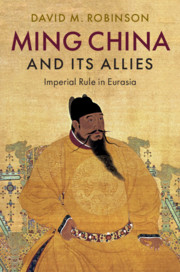'Far from rejecting all things foreign, the early Ming emperors - each in his own way - continued both relations with Mongol successor regimes near and far, and the splendid and personal Mongol-style rule and diplomacy. Robinson sheds new light on the Ming court, the Yongle emperor, and the Tu Mu incident.'
Sarah Schneewind - University of California, San Diego
'David Robinson brilliantly explores the entanglements of dynastic succession in the aftermath of the demise of the Mongol Yuan dynasty. The book provides expert guidance and utterly novel insights as it unravels the intricacies of court and international politics. Drastically refashioning the common image of a dynasty that resurrected Chinese civilization after an age of foreign rule and barbarism, Robinson shows the early Ming emperors as savvy politicians who valued and used the Mongols, their erstwhile rulers, as allies and subjects. The striking originality of Robinson’s interpretation of early Ming emperorship, and the exacting depth of its research, make this book a true gem of historical scholarship.'
Nicola Di Cosmo - Institute for Advanced Study, New Jersey
'David Robinson's fascinating new book locates the Ming dynasty firmly in its full Eurasian context. Focusing on the early Ming relations with the Mongols - their subjects, rivals and allies - he illuminates both the early Ming emperors - their policies, personalities and concepts of rulership - and the post-Chinggisid world within which they operated. Meticulously researched, and stressing the Ming's Inner Asian identity, the book offers a new interpretation of China's place in the early modern world. A must for anyone interested in Late Imperial China, the legacy of the Mongol Empire, and early modern history.'
Michal Biran - Hebrew University of Jerusalem
‘… the book is a significant addition to the study of Chinese history as well as Mongolian history, and indeed Central Eurasian and World History … it is accessible to non-specialists … this study serves as a useful model for similar studies on other empires in world history.’
Timothy May
Source: Journal of Chinese Military History
‘Robinson’s new book breaks away from the old Ming-Mongol binaries prevalent in historical sources and historiography. this book makes significant scholarly contributions by telling a new story about Ming rulership and by opening up new possibilities in research on Eurasian connectivity and comparative empires.'
Ying Zhang
Source: China and Asia



